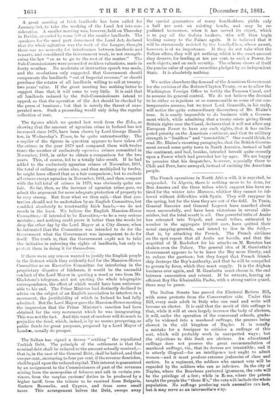The Italian Senate has passed the Electoral Reform Bill, with
some protests from the Conservative side. Under this Bill, every male adult in Italy who can read and write will become an elector. It is said that the merit of this suffrage is that, while it will at once largely increase the body of electors, it will, under the operation of the communal schools, gradu- ally be widened into a manhood suffrage, the process being slowest in the old kingdom of Naples. It is usually a mistake for a foreigner to criticise a suffrage of this sort, which will probably work in unexpected ways ; but the objections to this limit are obvious. An educational suffrage does not possess the great recommendation of manhood suffrage, viz., that its decrees are irresistible ; and it is utterly illogical—for an intelligence test ought to admit women—and it must produce extreme jealousies of class and section. In a regiment, the soldiers who cannot vote will be regarded by the soldiers who can as inferiors. In the city of Naples, where the Bourbons preferred ignorance, the vote will be the privilege of a few ; while in Rome, where the priests taught the people the "three R's," the vote will include the whole population. No suffrage producing such anomalies can last, but it may serve as an intermediate step.






































 Previous page
Previous page